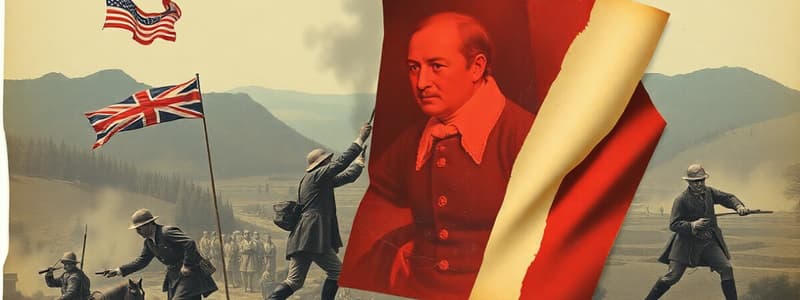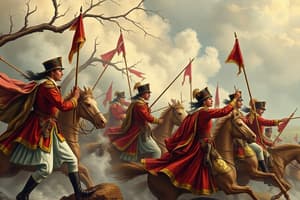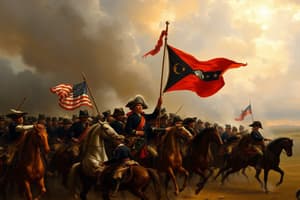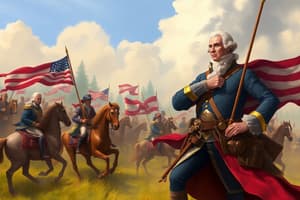Podcast
Questions and Answers
What was a primary reason for the British shifting their strategy to the Southern colonies during the American Revolutionary War?
What was a primary reason for the British shifting their strategy to the Southern colonies during the American Revolutionary War?
- To negotiate peace with the French forces.
- To exploit the resources and loyalist support in the South. (correct)
- To establish a strong naval presence in the Caribbean.
- To surround and cut off the Continental Army in the North.
What pivotal change occurred in the strategy of the Continental Army during the Revolutionary War?
What pivotal change occurred in the strategy of the Continental Army during the Revolutionary War?
- They adopted guerrilla warfare and sought French alliances. (correct)
- They started fighting exclusively in major cities.
- They focused on naval battles rather than land engagements.
- They abandoned the war effort due to early defeats.
What outcome resulted from the American victory at the Battle of Saratoga?
What outcome resulted from the American victory at the Battle of Saratoga?
- It diminished morale in the Continental Army.
- It caused the British to surrender immediately.
- It led to the formal entry of France as an American ally. (correct)
- It prompted Spain to join the war against Britain.
During which event did Prussian General Friedrich Von Steuben significantly enhance the training of the Continental Army?
During which event did Prussian General Friedrich Von Steuben significantly enhance the training of the Continental Army?
What was the British Army's initial strategy in the American Revolutionary War?
What was the British Army's initial strategy in the American Revolutionary War?
How did the Continental Army's perception of military tactics evolve as the war progressed?
How did the Continental Army's perception of military tactics evolve as the war progressed?
What did the British Army hope to gain from leveraging Loyalist support in the South?
What did the British Army hope to gain from leveraging Loyalist support in the South?
Which aspect helped to improve the morale of the Continental Army after some early setbacks?
Which aspect helped to improve the morale of the Continental Army after some early setbacks?
What was a consequence of the Continental victories in the North?
What was a consequence of the Continental victories in the North?
What was one significant impact of French support in the Revolutionary War after the Battle of Saratoga?
What was one significant impact of French support in the Revolutionary War after the Battle of Saratoga?
What was a primary purpose of the Declaration of Independence?
What was a primary purpose of the Declaration of Independence?
Which concept differentiates natural rights from other types of rights?
Which concept differentiates natural rights from other types of rights?
What was a significant concern that led to the initial ban of African Americans from the Continental Army?
What was a significant concern that led to the initial ban of African Americans from the Continental Army?
What was the principal effect of Thomas Paine's pamphlet "The Crisis" on American troops?
What was the principal effect of Thomas Paine's pamphlet "The Crisis" on American troops?
How did the Declaration of Independence justify the colonies' actions during the Revolutionary War?
How did the Declaration of Independence justify the colonies' actions during the Revolutionary War?
What misconception did many people have regarding natural rights?
What misconception did many people have regarding natural rights?
What impact did African American participation in the Continental Army have later in the war?
What impact did African American participation in the Continental Army have later in the war?
What role did 'Common Sense' play in the American Revolution?
What role did 'Common Sense' play in the American Revolution?
What was a common strategy employed by the British army during the Revolutionary War?
What was a common strategy employed by the British army during the Revolutionary War?
What was a misconception regarding Thomas Paine's influence during the Revolutionary War?
What was a misconception regarding Thomas Paine's influence during the Revolutionary War?
What was the primary purpose of Thomas Paine's 'Common Sense' in the colonies?
What was the primary purpose of Thomas Paine's 'Common Sense' in the colonies?
Which of the following best describes the concept of Natural Rights as it related to the Declaration of Independence?
Which of the following best describes the concept of Natural Rights as it related to the Declaration of Independence?
What significant role did African Americans play in the Continental Army?
What significant role did African Americans play in the Continental Army?
Which strategy did the Continental Army primarily rely on during the Revolutionary War?
Which strategy did the Continental Army primarily rely on during the Revolutionary War?
What was a key outcome of the Second Continental Congress meeting in May 1775?
What was a key outcome of the Second Continental Congress meeting in May 1775?
How did the Declaration of Independence address grievances against King George III?
How did the Declaration of Independence address grievances against King George III?
Which of the following best characterizes the British Army's strategy during the American Revolutionary War?
Which of the following best characterizes the British Army's strategy during the American Revolutionary War?
Which argument found in 'Common Sense' helped mobilize colonists towards independence?
Which argument found in 'Common Sense' helped mobilize colonists towards independence?
What was the main focus of the First Continental Congress in response to the Coercive Acts?
What was the main focus of the First Continental Congress in response to the Coercive Acts?
Flashcards are hidden until you start studying
Study Notes
Continental and British Strategies in the American Revolution
- The Continental Army initially focused on traditional battles but switched to guerrilla warfare and relying on French alliances.
- The British initially tried to control major cities and North American key areas but later shifted to a "Southern Strategy" to gain Loyalist support in the South.
The Saratoga Turning Point
- The American victory at the Battle of Saratoga in 1777 significantly boosted morale and convinced France to join the war, providing support that ultimately helped secure independence.
Training at Valley Forge
- Prussian General Friedrich Von Steuben and the Marquis de Lafayette helped train and equip the Continental Army during the winter of 1777-1778 at Valley Forge, Pennsylvania.
- This period marked a pivotal moment in the war, when the Continental Army significantly improved its military discipline and training under harsh conditions.
Northern Victories
- The Continental Army won major victories in the North, including at Saratoga and Yorktown.
British Southern Strategy
- The British wanted to move the war south because they believed there was a larger concentration of Loyalist support in the Southern colonies.
- They hoped to leverage this population to bolster their forces and gain an advantage against the Patriot revolutionaries, especially by utilizing the South’s key economic resources.
The Declaration of Independence
- The Declaration of Independence formally announced the American colonies' separation from Great Britain.
- It outlined the reasons for seeking independence, explaining grievances against the British government.
- The document aimed to rally colonists, gain foreign support, and effectively declare their freedom to the world.
Natural Rights in the Declaration of Independence
- Natural rights, included in the Declaration of Independence, are considered inherent to all people by virtue of their existence.
- They are not granted by any government or legal system; rather, they are fundamental rights that pre-exist any government structure.
- They are seen as "God-given" rights that cannot be taken away, such as the right to life, liberty, and the pursuit of happiness.
African Americans and the Continental Army
- African Americans were initially banned from the Continental Army because Southern slave owners feared that arming enslaved people could lead to widespread slave rebellions.
- This concern was shared by many leaders, including George Washington.
Thomas Paine's "The Crisis"
- "The Crisis," a series of pamphlets written by Thomas Paine, significantly boosted the morale of American troops.
- The pamphlets delivered a powerful message of hope, patriotism, and the righteousness of the cause.
- They encouraged troops to see the struggle as a fight for liberty and not just a military campaign.
- They led to a renewed commitment to the cause.
The Stamp Act of 1765
- The Stamp Act required colonists to purchase stamps for all printed materials, including newspapers, legal documents, and playing cards.
- Colonists viewed it as a direct and unfair tax as they had no representation in British Parliament.
- It sparked widespread protests and boycotts, ultimately leading to its repeal in 1766.
The Tea Act of 1773
- The Tea Act granted the British East India Company a monopoly on tea sales in the American colonies.
- It was seen as a maneuver to undermine colonial merchants and promote British interests.
- It further ignited tensions and led to the Boston Tea Party, a pivotal event in the road to revolution.
The Intolerable Acts (Coercive Acts)
- These acts were passed by the British Parliament in response to the Boston Tea Party.
- They were intended to punish the colonists for their defiance and asserted British authority.
- They included:
- The Boston Port Act, closing the port to all trade.
- The Massachusetts Government Act, replacing the elected government with a royal governor.
- The Administration of Justice Act, allowing British officials to be tried for crimes in other colonies.
- The Quartering Act, requiring colonists to house British soldiers.
Colonial Response to the Coercive Acts
- The colonists responded with a combination of unity, resistance, and the creation of the Continental Congress.
- They boycotted British goods and petitioned the King and Parliament to repeal the Acts.
- They formed Committees of Correspondence for communication and organization.
- They organized local militias for defense.
The Second Continental Congress and Battles of Lexington and Concord
- The Second Continental Congress met in Philadelphia in May 1775 in response to the Battles of Lexington and Concord.
- The battles, which took place on April 19, 1775, marked the beginning of the American Revolutionary War.
- The Congress was called upon to lead the war effort.
Decisions of the Second Continental Congress
- The Congress raised an army, appointing George Washington as commander-in-chief.
- They issued the Olive Branch Petition, a final attempt to reconcile with Britain.
- They drafted and approved the Declaration of Independence, formally declaring independence from Great Britain.
- They served as the government of the 13 colonies, and later the United States, from 1774 to 1789.
Thomas Paine's "Common Sense"
- Thomas Paine’s "Common Sense" powerfully swayed public opinion towards the idea of independence from Great Britain.
- It effectively united colonists behind the cause of the American Revolution.
- It presented clear, accessible arguments for separation from British rule.
- It is considered a key catalyst for the Declaration of Independence.
Studying That Suits You
Use AI to generate personalized quizzes and flashcards to suit your learning preferences.




